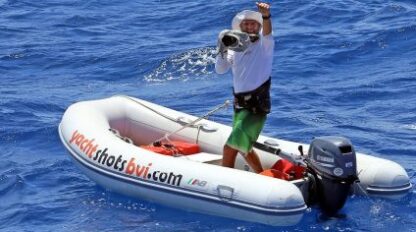A Throwback Mystery
Below is a piece we found in the 2007 Sail Caribbean archive files. The mystery is that now we don’t know who wrote the introduction and assembled these quotes. Will the staff member responsible please step forward to receive a big thank you from us all!
Man’s Changing Views of the Oceans
Following are a set of quotations that I have assembled concerning the oceans and reflecting society’s changing views of the marine environment. I cannot imagine a modern poet seeing the ocean as “The blue, the fresh, the ever free!”, as did Bryan Procter (as Barry Cornwall) in the late 1830s, nor a scientist now referring to the sea as “a conservator of wastes and a reservoir of food,” as was stated in a 1917 government report (below). Still, few members of today’s public realize how dire the situation seems to have become, indicated in some of the last quotations from well-respected marine scientists near the end of the twentieth century and the beginning of the new millennium. The final quotation is from a website that opened in early 2003 as the present choice of communication to the masses – seeking to inform the public that things are really bad and that it is going to take resolution and action by all of us to fix it.
The quotations are offered in chronological order:

A dark
Illimitable ocean without bound,
Without dimension, where length, breadth, and height
And time and place are lost
— John Milton “Paradise Lost” 1667
Roll on, thou deep and dark blue Ocean — roll!
Ten thousand fleets sweep over thee in vain;
Man marks the earth with ruin — his control
Stops with the shore.
— Lord Byron “Childe Harold’s Pilgrimage” 1818
 The sea! the sea! the open sea!
The sea! the sea! the open sea!
The blue, the fresh, the ever free!
— Bryan W. Procter “The Sea” ca. 1837
To me the sea is a continual miracle;
The fishes that swim-the rocks-the motion of the waves-the ships, with men in them,
What stranger miracles are there?
— Walt Whitman “Miracles” 1856
“The Sea as a Conservator of Wastes and a Reservoir of Food”
— Title of a Smithsonian Institution Annual Report for 1917 by H. F. Moore
There is the life of the plankton in almost 
endless variety; there are the many kinds of fish, both surface and bottom living; there are the hosts of different invertebrate creatures on the sea-floor; and there are those almost grotesque forms of pelagic life in the oceans depths. Then there are the squids and cuttlefish, and the porpoises, dolphins and great whales.
— Sir Alister Hardy “The Open Sea” 1956
It was during and after the Second World War that the great expansion [in oceanography], which is still going on, began. The realization by governments of the importance of marine problems and their readiness to make money available for research, the growth in the number of scientists at work and the increasing sophistication of scientific equipment, have made it feasible to study the ocean on a scale and to a degree of complexity never attempted and never possible before.
… As man increasingly overcrowds and exploits his tiny planet, the significance of the oceans which cover seven tenths of its surface have suddenly become apparent.
— Margaret Deacon “Scientists and the Sea 1650-1900” 1971
 [It is] immoral to damage needlessly a remote and largely unknown assemblage of organisms — even if they are out-of-sight, out-of-mind, and apparently of little importance to the general ecological processes in the ocean — through negligent and ignorant abuse of the oceans.
[It is] immoral to damage needlessly a remote and largely unknown assemblage of organisms — even if they are out-of-sight, out-of-mind, and apparently of little importance to the general ecological processes in the ocean — through negligent and ignorant abuse of the oceans.
— Martin Angel in “Ocean Trench Conservation” 1982
The last fallen mahogany would lie perceptibly on the landscape, and the last black rhino would be obvious in its loneliness, but a marine species may disappear beneath the waves unobserved and the sea would seem to roll on the same as always.
— G. Carleton Ray in “Biodiversity”, National Academy Press, 1988
The tradition of freedom of the high seas has its roots in an era when there were too few people to seriously violate the oceans — but in hindsight that era ended some 150 years ago with the increase of global whaling.
— James Carlton in speech to University of Washington School of Marine Affairs, 1998
Each succeeding generation of biologists has markedly different expectations of what is natural, because they study increasingly altered systems that bear less and less resemblance to the former, pre-exploitation versions.
— Paul Dayton in “Science” 1998
 We suggest that in the next decades fisheries management will have to emphasize the rebuilding of fish populations embedded within functional food webs, within large ‘no-take’ marine protected areas.
We suggest that in the next decades fisheries management will have to emphasize the rebuilding of fish populations embedded within functional food webs, within large ‘no-take’ marine protected areas.
— Daniel Pauly et al. in “Science” 1998
We estimate that large predatory fish biomass today is only about 10% of pre-industrial levels. We conclude that declines of large predators in coastal regions have extended throughout the global ocean, with potentially serious consequences for ecosystems.
— Ransom Myers and Boris Worm in “Nature” 2003
What this project is about: the truth about ocean decline. This website seeks to review the current problems, from coral-reef death, to kelp forest over-fishing, to global fisheries depletion. We are not exaggerating the problems — the facts speak loud enough. We want you to realize how serious the problems have become; learn that today’s ocean problems are at the global and ecosystem level.
http://www.shiftingbaselines.org (2003)
They that go down to the sea in ships, that do business in great waters, these see the works of the Lord and his wonders in the deep.
Hebrew Bible. Psalms 107:23–24.
When men come to like a sea-life, they are not fit to live on land.
Samuel Johnson (1709–84), English author, lexicographer. Quoted in: James Boswell, Life of Samuel Johnson, 18 March 1776 (1791).
 Those who live by the sea can hardly form a single thought of which the sea would not be part.
Those who live by the sea can hardly form a single thought of which the sea would not be part.
Hermann Broch (1886–1951),
Austrian novelist.
The Spell, Foreword (1976; tr. 1987).
The sea is mother-death and she is a mighty female, the one who wins, the one who sucks us all up.
Anne Sexton (1928–74), U.S. poet. The Poet’s Story, “A Small Journal” (ed. by Howard Moss, 1974), entry for 19 Nov. 1971.
The sea, washing the equator and the poles, offers its perilous aid, and the power and empire that follow it. . . . “Beware of me,” it says, “but if you can hold me, I am the key to all the lands.”
Ralph Waldo Emerson (1803–82), U.S. essayist, poet, philosopher. The Conduct of Life, “Wealth” (1860).
There is nothing so desperately monotonous as the sea, and I no longer wonder at the cruelty of pirates.
James Russell Lowell (1819–91), U.S. poet, editor. Fireside Travels, “At Sea” (1864).
For whatever we lose (like a you or a me) it’s always ourselves we find in the sea
e. e. cummings (1894–1962), U.S. poet. maggie and milly and molly and may.
As usual I finish the day before the sea, sumptuous this evening beneath the moon, which writes Arab symbols with phosphorescent streaks on the slow swells. There is no end to the sky and the waters. How well they accompany sadness!
Albert Camus (1913–60), French-Algerian philosopher, author. American Journals (1978; tr. 1988), written 3 July 1949, while crossing the Atlantic en route to South America.






